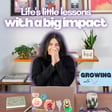
Surviving State Violence for the Anxious Girlie: Finding Safety in Uncertain Times
This is the grounding conversation we all need when survival mode becomes daily life. The moment when ICE notifications pop up two miles from home and you're left asking: is this paranoia or just what we need to survive?
Here's what we're unpacking with Cynthia Magaña, the Chicana Therapist:
- Understanding "shock and awe" as a military tactic designed to create trauma responses - and why our reactions are normal responses to abnormal events
- How collective trauma affects us all, even when we're not directly targeted, and why metabolizing anger productively matters more than performing online
- Finding your role in social change beyond frontline protest (organizers, healers, caregivers, bridge-builders) and asking "who am I keeping safe?"
- Concrete safety planning: emergency contacts, ICE tracking apps, five-minute family check-ins, and creating parameters that actually work
- Navigating family with different ideologies during crisis - from opposing Tíos at holidays to that adult "rite of passage" of standing up to elders
From getting Ring notifications about ICE trucks nearby to recognizing we don't heal in isolation, this conversation provides psychological frameworks and practical tools for surviving state violence while protecting your mental health.
Because here's what Cynthia knows as a therapist: Our bodies respond to keep us safe through fight/flight/freeze/fawn. The key is pausing to metabolize information before reacting, understanding that virtue signaling has real consequences for those without certain privileges, and remembering that showing up for community means decompression gatherings and chosen family too.
Guest: Cynthia Magaña. A queer, Latinx clinical social worker specializing in culturally affirming, trauma-informed care for first-generation professionals and cycle breakers healing intergenerational wounds. She's also a yoga teacher and sound bath practitioner who believes healing happens in community, not isolation. Find her @chicanatherapist on Instagram or visit cynmagana.com. Listen to Cynthia's Healing Playlist in Spotify.
Subscribe. Share. Remember that we don't go through this alone - community care is how we survive.
Small steps, big healing. Keep growing! ✨
Join the conversation! How are you staying grounded right now? DM me your stories on Instagram @YourCoachMari
🎧 Related Episode: How All About Love: New Visions by Bell Hooks Predicts Today's Social Issues - Bell Hooks predicted our current loneliness epidemic, reminding us that healing happens in community, not isolation.
💬 LET'S CONNECT:
Send in questions: contact+podcast@marisolmoran.com
We might just have the same taste in books. Check out my Book List.
(Bookshop affiliate)
🌱 LET’S GROW TOGETHER
